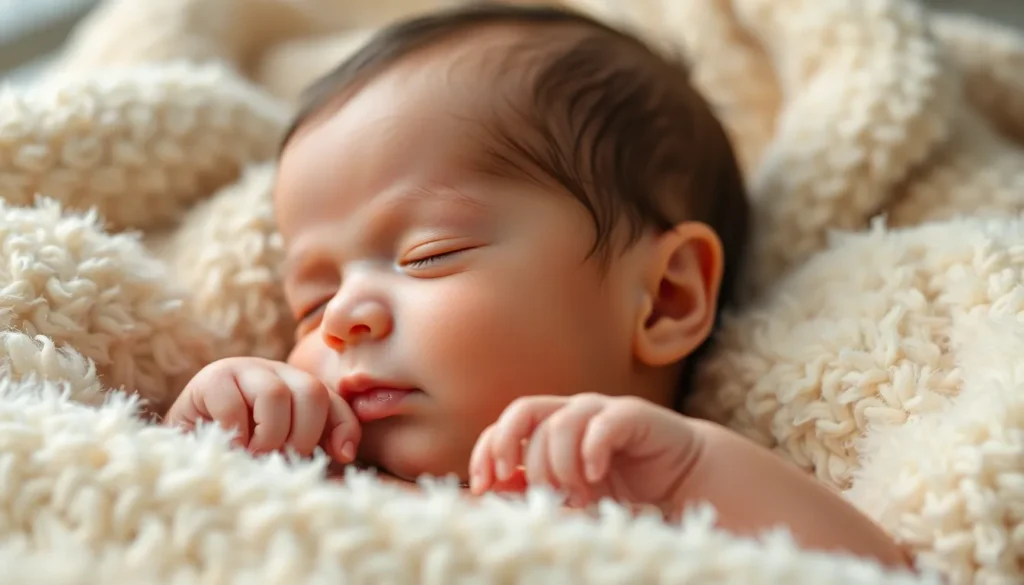Hiccups in newborns might just be the cutest little quirk of early life, but they can leave new parents scratching their heads. Picture this: your tiny bundle of joy suddenly starts making those adorable “hic” sounds, and you can’t help but wonder if they’re trying to communicate from the other side of the womb. Spoiler alert: they’re not.
Table of Contents
ToggleUnderstanding Hiccups In Newborns
Hiccups are a common occurrence in newborns. These involuntary contractions of the diaphragm can happen unexpectedly, often leaving parents curious about their meaning.
What Are Hiccups?
Hiccups refer to brief, repetitive contractions of the diaphragm. When the diaphragm contracts, a sudden intake of air occurs, which creates the characteristic “hic” sound. Newborns experience this phenomenon frequently, sometimes several times a day. Hiccups usually resolve on their own and do not pose any harm to the baby.
Causes Of Hiccups In Newborns
Hiccups often arise due to a few contributing factors. Overeating can stretch the stomach, leading to diaphragm contractions. Rapid feeding typically introduces excess air, triggering hiccups as well. Changes in temperature, such as moving from warm environments to cooler ones, also play a role. Lastly, excitement or stress may cause a newborn to hiccup, linked to their still-developing nervous system.
Symptoms And Diagnosis

Hiccups in newborns are usually easy to identify. A noticeable twitching in the baby’s chest often accompanies the sound. These involuntary contractions may last just a few seconds or extend for several minutes. During hiccup episodes, the baby may appear relaxed, but sometimes they might seem a bit startled. Observing these patterns can help parents understand that hiccups are generally normal.
Recognizing Hiccups In Newborns
Recognizing hiccups in newborns is straightforward. Common signs include rhythmic contractions in the diaphragm area, accompanied by distinctive sounds. Parents may observe their newborns experiencing these hiccups after feeding or during quiet moments. Familiarity with the signs helps in distinguishing hiccups from distress or other physical issues. Each episode may occur multiple times throughout the day without any other symptoms, providing reassurance of its commonality.
When To Seek Medical Advice
Seeking medical advice becomes necessary under certain conditions. If hiccups persist beyond 30 minutes, parents should consult a pediatrician for evaluation. Additional concerns arise when hiccups accompany other symptoms, such as irritability or feeding difficulties. Changes in breathing patterns during hiccup episodes require immediate attention. Understanding when to reach out to a healthcare provider helps ensure the newborn’s well-being.
Prevention And Management
Hiccups in newborns can be managed effectively with a few strategies. Understanding these tips can help parents minimize their occurrence.
Tips To Prevent Hiccups
Avoiding overeating significantly reduces the chances of hiccups. Feeding smaller amounts more frequently can also help maintain comfort. Keeping the baby calm during feeding promotes relaxation, which may prevent spasms. Engaging in gentle burping every few minutes may aid digestion and reduce hiccups as well. Gradually changing the baby’s position post-feeding contributes to a more relaxed diaphragm.
Home Remedies For Hiccups
Several home remedies can soothe newborn hiccups. Offering a pacifier often helps distract the baby, encouraging calmness. Gently rubbing or patting the baby’s back can relieve discomfort and promote relaxation. Using a cold washcloth on the forehead has been effective for some parents. Engaging the baby in a quiet activity may also help settle them down.
Common Misconceptions
Parents often hold misconceptions about hiccups in newborns, thinking they may indicate a health issue or distress. Many believe that frequent hiccups mean something is wrong. Such thoughts can cause unnecessary worry. Hiccups are a normal, natural occurrence in infants, reflecting their developing nervous systems.
Myths About Hiccups In Newborns
One common myth suggests that hiccups are a sign of overeating. While overeating can contribute, hiccups in newborns can occur from various factors like gas or sudden excitement. Another misconception is that hiccups can cause harm to the baby. In reality, hiccups are harmless and usually resolve without intervention. Some might think hiccups only happen during or after feeding. Hiccups can also occur during sleep or play, emphasizing their spontaneous nature.
Facts You Should Know
Hiccups are involuntary contractions of the diaphragm and aren’t a cause for alarm. Though they may last from a few seconds to several minutes, most episodes are brief. Many parents notice that their baby might seem relaxed during hiccup episodes. Parents should remember that it’s common for infants to experience this phenomenon multiple times a day. Consulting a pediatrician becomes crucial if hiccups persist longer than 30 minutes or if accompanied by other concerning symptoms, ensuring the baby’s health remains prioritized. Hiccups don’t signify communication or distress; they occur naturally in healthy infants.
Hiccups in newborns are a normal part of early development that many parents encounter. While they can be surprising and sometimes concerning, these involuntary contractions are typically harmless and resolve on their own. Understanding the causes and recognizing the signs can help parents navigate this common experience with confidence.
By employing simple strategies for prevention and management, parents can ease their baby’s discomfort during hiccup episodes. Staying informed and knowing when to seek medical advice ensures that any potential issues are addressed promptly. Ultimately, embracing this charming quirk of infancy can make the journey of parenthood even more delightful.




